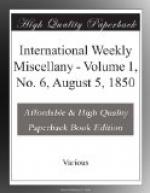* * * * *
THE DUKE OF CAMBRIDGE.
The death of the Duke of Cambridge, brother of the late William IV., occurred the 8th of July, and was quite sudden. He was the seventh son of George III., was born in 1774, received his earliest education at Kew, and finished his studies at Gottingen. He entered the army, and experiencing much active service, was promoted, until in 1813 he attained the distinction of Field Marshal. He soon afterward became Governor-General of Hanover, and continued to fill that post until the accession of the Duke of Cumberland, in 1839. His subsequent life presented few features of much interest. His name was to be found as a patron and a contributor to many most valuable institutions, and he took delight in presiding at benevolent festivals and anniversary dinners, when, though without the slightest pretension to eloquence, the frankness and bonhommie of his manners, and his simple straight-forward earnestness of speech, used to make him an universal favorite. He took but little part in the active strife of parties. He died in his seventy-seventh year, leaving one son, Prince George of Cambridge, and two daughters.
* * * * *
GEORGE W. ERVING.
This distinguished public man died in New York, on the 22d ult. A correspondent of the Evening Post gives the following account of his history:
“The journals furnish us with a brief notice of the death of the venerable George W. Erving, who was for so many years, dating from the foundation of our government, connected with the diplomatic history of the country, as an able, successful and distinguished negotiator. The career of this gentleman has been so marked, and is so instructive, that it becomes not less a labor of love than an act of public duty, with the press, to make it the occasion of comment. At the breaking out of our revolution, the father of the subject of this imperfect sketch was an eminent loyalist of Massachusetts, residing in Boston, connected by affinity with the Shirleys, the Winslows, the Bowdons, and Winthrops of that State. Like many other men




